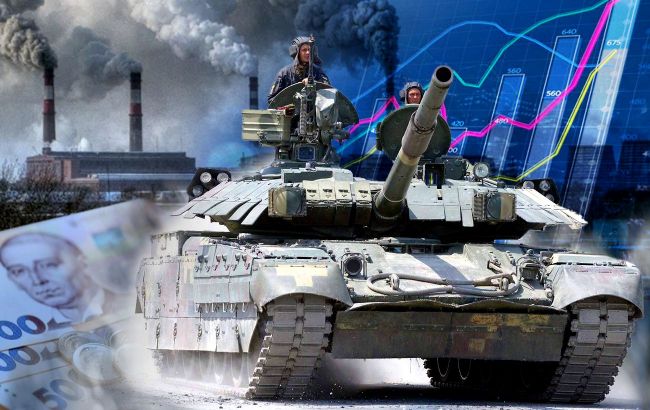More taxes, less income: Potential wartime economy and its impact on country
 The wartime economy implies a reduction in import consumption (collage: RBC-Ukraine)
The wartime economy implies a reduction in import consumption (collage: RBC-Ukraine)
The Ukrainian economy may have to switch to wartime rails to win the war with Russia. It is worth preparing for certain steps to be taken in this regard as early as 2025, Finance Minister Serhii Marchenko warns. RBC-Ukraine learned what the wartime rails of the economy mean and how the transition to it will change the country's life.
The material was prepared based on statements by Finance Minister Serhii Marchenko, Professor of the University of California at Berkeley Yurii Horodnichenko, exclusive comments from lawyers, the NBU press service, as well as Deputy Director of the National Institute for Strategic Studies Yaroslav Zhalil and Chairman of the Verkhovna Rada Committee on Finance, Taxation, and Customs Policy Danylo Hetmantsev.
What are the wartime rails that, according to Finance Minister Serhii Marchenko, the Ukrainian economy must move to win the war against Russia? And what kind of rails has the Ukrainian economy been running on for almost two years of full-scale war, not to mention the fact that Russia's war against us has been going on since 2014?
Minister of Finance statements
Last week, Ukraine's Finance Minister Serhii Marchenko said that Ukrainians may have to reduce their consumption of goods and services by several times. In his opinion, Ukrainians consume too many imported goods, which is why huge amounts of foreign currency are spent on consumer goods instead of military purposes. This, in turn, weakens Ukraine's economic potential.
"As the Minister of Finance, I will say that wartime rails are not only about the military industry but also about the public understanding that we are at war. Unfortunately, we are still living in a rather specific reality, when everything is fine, we have macroeconomic and exchange rate stability. But this reality will need to be corrected if we want to switch to a wartime mode. This is a limitation of public consumption. We need to reduce it by several times because we consume mostly imported goods and services, which determines our economic potential," Marchenko said.
 Finance Minister Serhii Marchenko (Photo: Getty Images)
Finance Minister Serhii Marchenko (Photo: Getty Images)
According to the Minister, the wartime rails will include different tax and expenditure regimes. "We have to prepare for this and, thinking about 2025, we have to lay down the appropriate scenarios," the Minister warned.
What questions are worth answering
First of all, we need to understand what a war economy entails. To do this, in particular, we need to answer three sets of questions.
No. 1 What will the transition of the economy to wartime rails mean for citizens?
- How might the incomes of citizens change?
- To what extent might consumption be reduced?
- For example, are individuals at risk of having their foreign currency deposits confiscated in favor of the state? What does the law say about this?
No. 2 What will the transition of the economy to wartime rails mean for business?
- What will this mean for business, both public and private?
- Are legal entities at risk of having their foreign currency deposits confiscated in favor of the state?
- To what extent can the list of critical imports be narrowed?
- What can exporters expect - stimulus aid from the state or, for example, stricter requirements for the sale of foreign currency earnings?
- How might the system of collecting taxes, excise duties, customs duties, etc. change?
No. 3 What will the transition of the economy to wartime rails mean for the state?
- How will public spending priorities change?
- How will government priorities in the production sector change?
- What changes should we expect in taxation?
- How will the role of law enforcement and semi-law enforcement (fiscal) agencies in the economy change?
- How exactly will the controlling bodies, the Customs, and the Tax Service "tighten the screws"?
What does a wartime economy entail?
The wartime economy is formed by the state taking into account the restrictions on economic, social, and other freedoms of citizens during the war based on martial law. In Ukraine, the legal regime of martial law is defined by the Law "On the legal regime of martial law".
The economy has an overall impact on the course and outcome of the war. First, the economy is the objective basis for the emergence of social conflicts that are resolved through war. Second, the economy is the material and technical base of armed struggle. To wage war, you need weapons and many other things that the economy provides. It is the economy that, with the help of military equipment and human resources, determines the organization, forms, and methods of armed struggle, military tactics, and strategy.
The relationship between the economy and war is two-way:
- war diverts significant financial, material, and human resources from the production sector to the unproductive non-production sphere;
- war and military needs shape the structure of the economy itself;
- war leads to the direct destruction of productive forces, and in this regard, the task of preserving production, and labor force and ensuring the viability of the economy arises.
The United States during World War II
In an article for Vox Ukraine in the first months of the full-scale Russian invasion, Professor Yurii Horodnichenko of the University of California, Berkeley, listed the lessons that Ukraine should have learned from the experience of World War II.
 Professor Yurii Horodnichenko (Photo: Getty Images)
Professor Yurii Horodnichenko (Photo: Getty Images)
First, war requires a huge mobilization of the economy. At the height of the Second World War, military spending by states accounted for a very large share of GDP: 42% in the US, 55% in the UK, 70% in Germany, and 74% in Japan. This meant that private consumption had to be limited. This goal was achieved through a combination of several strategies, ranging from incentivizing savings to outright banning the purchase of goods for private consumption. For example, between 1943 and 1945, American consumers could not buy new cars.
Second, although capitalist countries maintained market economies during the war, governments played a crucial role in resource allocation.
Third, strategic materials were the most bottlenecks. All countries had to deal with shortages of food, rubber, and oil. The inability of Japan and Germany to secure supplies of raw materials made their military operations limited.
The fact that in 2022, in the first weeks of the invasion of Ukraine, Russian troops did not make much progress (Russian equipment literally ran out of fuel) emphasizes the importance of logistics.
Fourth, public procurement was conducted differently. To ensure fast and stable deliveries, the U.S. government switched from tender contracts to direct negotiations. The government gave large, complex orders to large firms because they had more organizational capital and were more likely to produce the products. Mass production was crucial for reducing costs.
Fifth, wars are very expensive, and thus there needs to be a reliable financing model that can sustain the high rates of the war economy. For example, in Ukraine, it has been estimated that the country needs $5-7 billion per month (about 40-50% of monthly pre-war GDP) to support the war effort and the economy.
Due to the huge costs of arms procurement during World War II, governments were forced to raise taxes. For example, the number of households in the United States that paid income tax increased from 4 million in 1939 to 50 million in 1945. In addition to broadening the tax base, the Roosevelt administration raised tax rates, with the top income bracket reaching 90%. However, even this huge increase in tax revenue was not enough. Most wars are not financed by taxes.
The Federal Reserve System not only printed money to directly purchase government debt securities but also kept interest rates low to minimize the cost of servicing the public debt. 85 million Americans (out of a total population of just under 140 million) purchased government securities between 1941 and 1946. Many people opted for automatic deductions from their paychecks to buy war bonds.
Returning to the war in Ukraine, Professor Horodnichenko notes that if a country wants to win a war of attrition, the domestic economy must work. Ukraine cannot blindly copy the strategies of the Second World War, but many of the lessons from that time - mobilization, centralization, focus on protecting supplies and production lines, mass production - remain relevant. A war of attrition with an empty budget is impossible.
Scientists and lawyers warn
Yaroslav Zhalilo, Deputy Director of the National Institute for Strategic Studies, states that Ukraine's economy is already on a war footing. And it should continue intensively in the future. The key condition is the ability of the economy to function stably in the long term, ensuring both military production within the limits of the possible and the current functioning of the country.
The expert recalls the words of the President, who noted that six people in the civilian sector - not only employees but also taxpaying entrepreneurs - must work to provide for one soldier of the Defense Forces. Steadily filling the budget, the economy creates opportunities to finance the Defense Forces. The functioning of the economy is largely ensured by consumption, military production, exports, construction, and reconstruction.
"The financial system should work accordingly. Avoiding games in the pyramid of deposit certificates, putting into circulation the available liquid resource, which is largely derived from the same budget expenditures," Zhalilo explains.
He is also sure that in no case should local budget expenditures for development be blocked. But they should be directed in such a way that they maximize domestic demand.
And the eternal thing is to block the misuse of funds, especially corruption.
"The Ukrainian economy began transitioning to martial law as early as the beginning of the war in 2022. As we see it, this transition is still ongoing and is associated with the systematic transfer of the national economy to functioning in a special period and the point application of martial law measures in Ukraine. Some of these measures have already been introduced, and some have been applied not so actively and on a large scale," says Andrii Lytvyn, attorney at law at Ilyashev & Partners Law Firm.
In his opinion, the further transfer of the economy to martial law, taking into account the statements of top officials on the need to reduce public consumption, may be understood as the more active application of, for example, the labor duty of citizens, introduction of rationing of food and non-food products, increased use of enterprises and their employees for defense purposes, increased confiscation of private property for defense purposes, etc. The list of more specific measures to ensure the functioning of the economy during the special period should be determined by the Cabinet of Ministers.
"Is there a threat of confiscation of currency valuables of individuals and legal entities in favor of the state - it is possible. After all, the legislation provides for such a measure of the martial law regime as the expropriation of property. In turn, businesses may face increased use of their production facilities and employees or confiscation of their property for defense purposes. It should be remembered that the viability of Ukraine is at stake. And if the state needs additional resources, it has the right to do so," the lawyer warns.
At the same time, Lytvyn believes that if the state does apply the above measures, it will not be massive and gradual. Most likely, the state will change tax regulations, and increase taxes, duties, and other fees. This will be especially true for imported goods.
As for the list of critical imports, even if it is narrowed, it will only be to stimulate domestic production. This is how they will try to increase budget revenues and accumulate funds in the national economy, Andrii Lytvyn believes.
His colleague, Dmytro Syrota, managing partner of Syrota Dzis Melnyk & Partners, warns that if the wartime economy is understood to mean an increase in taxes, pressure on business, and the total seizure of property for the needs of the Defense Forces, it will significantly affect business and may lead not only to a lack of investment but also to a mass exodus of businesses from Ukraine. Such an approach would be unreasonable and would lead to the bankruptcy of the state and the loss of the latter's resources.
According to the lawyer, putting the economy on a wartime rails should always take into account two key factors.
The first is the abandonment of unnecessary and non-essential expenses for the country's survival. For example, landscaping, parks, paving, new roads, and the like can wait. All these resources should be directed exclusively to defense.
The second factor is that there should be maximum business liberalization, which will create conditions for attracting investment and strong business development right now.
Among the most urgent needs is the introduction of long-term tax incentives for income tax and VAT. It is necessary to ensure the stability of the legal regime for foreign investors in most sectors of the economy.
"There is no need to be afraid of budget shortfalls. Scaling up business through liberalization will ensure its growth. At the same time, tax pressure will only lead to the closure and exit of operating businesses. As a result, budget revenues will decrease," the lawyer warns.
The war risk insurance fund guaranteed by the government should become fully operational. Other requirements of the time include the maximum simplification of regulatory and licensing procedures for the implementation of business projects; the creation of ready-made investment platforms ready for launch within the shortest possible time after the investment is received; and an end to the pressure of law enforcement and tax authorities on business.
"The wartime economy is not about confiscation and repression, but about directing state resources primarily to military needs. This means maximum preferences for the military-industrial complex and related industries while liberalizing the economy to attract investment," summarizes Dmytro Syrota.
Danylo Hetmantsev is against
Danylo Hetmantsev, head of the Parliamentary Committee on Finance, Taxation, and Customs Policy, in a commentary for RBC-Ukraine, notes that of all the tools provided for by the legislation on the legal regime of martial law, the government uses only those that are necessary or without which it will be impossible to solve defense problems.
.jpg) Danylo Hetmantsev (Photo: Getty Images)
Danylo Hetmantsev (Photo: Getty Images)
"During the 22 months of full-scale war, none of the top military and political leadership has even suggested, for example, labor duty. Instead, under the state program Army of Recovery, temporarily unemployed citizens were offered voluntary participation in community service. The level of payment is much higher than unemployment benefits and the possibility to stop such activities at any time," says Danylo Hetmantsev.
He assures that the authorities have never made any proposals, for example, about housing duty or trade restrictions. Except for alcohol, it is not a complete restriction, but within a certain time frame.
Hetmantsev notes that thanks to stable financing from partners, their military assistance, maintaining macroeconomic and exchange rate stability, and increasing budget revenues, it is now possible to avoid deviations from the usual framework of economic activity. This includes avoiding changes to the taxation system, which will be reformed in line with European standards after the war is over as part of the EU accession negotiations.
"Despite significant military expenditures, in 2024 the state will increase the minimum wage in two stages, conduct the next pension indexation as planned, and continue to fulfill all its social obligations under the Ukrainian legislation," assures Danylo Hetmantsev.
Optimistic National Bank
The National Bank of Ukraine responded to RBC-Ukraine's request by stating that the parameters under which the economy will operate in the event of a transition to martial law are unknown. Therefore, the regulator limited itself to the forecast included in the NBU's October macroeconomic forecast.
Thus, according to the NBU's macroeconomic forecast, consumption will continue to recover next year, growing by 5.7% after this year's 3.8% increase. It will remain below the potential level due to the effects of a full-scale war. At the same time, the gradual recovery in consumption will support the Ukrainian economy.
The revival of private consumption will be driven, in particular, by the expected growth in household incomes, both in real (i.e., adjusted for inflation) and nominal terms. Thus, according to the NBU's forecast, in 2024, nominal incomes will grow by 15.8%, and real incomes by 6.9%. In 2025, income growth will be 14% in nominal terms and 6.2% in real terms.
The increase in revenues will be facilitated by the recovery of economic activity and the maintenance of a loose fiscal policy.
The NBU notes that economic stability in wartime can be achieved, in particular, through the central bank's tight and independent monetary policy, fiscal consolidation by the government, structural reforms, and the use of market instruments to fill the budget.

